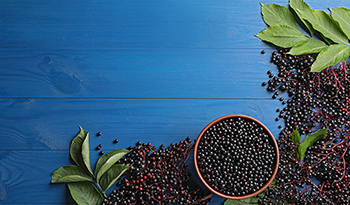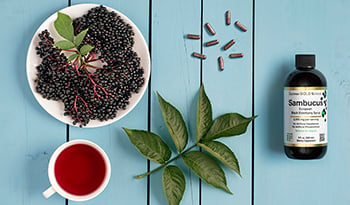The 7 Best Immune Supplements For Kids

Key Takeaways
- Foundation First: A balanced diet, adequate sleep, and good hygiene are the most important factors for a child's immune health.
- Key Supplements: The most evidence-backed supplements for kids' immunity are vitamin C, vitamin D, zinc, and probiotics.
- When to Use: Supplements can be particularly helpful during back-to-school time, in the winter months, or if your child is a picky eater.
- Safety is Key: Always consult your pediatrician before starting any new supplement and choose products specifically formulated for children.
Supporting An Immune Defense
A strong immune system is a big factor in keeping kids healthy and thriving. From the classroom to the playground, children come into contact with many new bacteria, viruses, and other microbes every day. When their immune system is working as it was designed, it helps them fight off common colds, flu, and other infections so they can grow, learn, and enjoy life to the fullest. Since kids’ defenses are still developing, giving them the right nutrition and support with key dietary supplements can go a long way in building lasting health.
The Best Immunity Supplements For Kids
Parents can help bolster their kids’ immune systems with the use of key dietary supplements. Here are the top seven:
1. Vitamin A: the “anti-infective” vitamin
Vitamin A or retinol was the first fat-soluble vitamin discovered, but that is not the only reason it was called "A." It was named to signify its "anti-infective" properties. Vitamin A is critical to the health and function of the cells of the skin and the mucous membranes that act as the first lines of defense against infection.
Vitamin A is also necessary for proper white blood cell function and enhances many of your immune system’s activities, including thymus function, tumor-fighting activity, and antibody response. Vitamin A is especially important for fighting off viruses.
For example, it has been found that lower vitamin A levels make people much more prone to viral respiratory tract infections. In addition, there is considerable scientific evidence showing that vitamin A supplementation in children produces significant benefits in improving immune function in children during a viral infection.
Vitamin A supplementation has been shown to be crucial in improving the health of children living in many parts of the world.1
2. Zinc: the “gatekeeper” of immunity
Zinc is referred to as the “gatekeeper” of immunity, as it is directly involved with so many aspects of immune function. When zinc levels are low, immunity drops considerably due to plummeting levels of specific virus-fighting white blood cells, as well as declines in key immune system activators and hormones from the thymus gland, the master control gland of the immune system.
Zinc can also act directly against certain viruses, such as those that cause the common cold. What’s more, zinc is also critical to a healthy respiratory and gastrointestinal tract lining as well as the proper absorption of nutrients by the intestinal tract. If zinc is not there in sufficient levels, the entire immune system is compromised, and the risk for infection increases dramatically.3-5
Zinc is available in many forms, including tablets, capsules, and lozenges.
3. Vitamin C: the key to immunity
Vitamin C is the key dietary supplement most people think about when they think “immune support,” especially when dealing with a cold.
Like other essential nutrients, vitamin C is critical to the function of the immune system. Vitamin C is critical in supporting the physical barriers against infection, like our skin and mucous membranes. And vitamin C literally turns on white blood cells to attack intruders and boosts the body’s antiviral compound interferon. It also supports antibody production and the secretion of hormones from the thymus.6
Like zinc, vitamin C can act to help the body’s defense mechanisms against viruses, which is one reason it is used to fight off colds. During an infection or when under any kind of stress, the need for vitamin C increases. The drop in vitamin C levels that stress produces is one of the reasons why people are more susceptible to the common cold during stressful events or situations.7
Vitamin C is available in all dietary supplement forms, with many products specifically designed for infants and kids.
4. Vitamin D: bone and immune system support
Though Vitamin D can be produced in our skin through the effects of UV light from the sun and through foods like fortified dairy products and fatty fish, taking a vitamin D3 supplement is important to ensure adequate levels, especially in children. And not just for their immune system, but also for bone health.
Vitamin D3 has been shown to produce a wide range of immune-enhancing effects. Several large studies have shown that people with higher blood levels of vitamin D3 and also people taking vitamin D3 as a supplement have a reduced rate of respiratory tract viral infections.8,9
In a meta-analysis published in the British Medical Journal, data from 25 randomized controlled trials with a total of 11,321 participants, ranging in age from infants to people 95 years old, found that in individuals with low blood levels of vitamin D3 who took a D3 supplement, it produced a 70% decrease in respiratory tract infections.8
Dosage recommendations:
- For children under the age of 5 years old, I recommend roughly 50 IU per pound per day.
- For children 5 to 9 years old, I recommend 2,000 IU per day.
- For children 9 to 12 years old, I recommend 2,500 IU per day.
- For children over 12 years old, I recommend the adult dosage of 2,000 to 5,000 IU per day.
5. Omega-3 Fatty Acids: the cell membranes' foundation
The long-chain omega-3 fatty acids EPA (eicosapentaenoic acid) and DHA (docosahexaenoic acid) found in fish and algal oil supplements play an important role in shaping children’s immune function.
Their basic function is as components in cellular membranes. DHA and EPA function in the membranes of white blood cells (T-cells, B-cells, macrophages) to improve cell signaling and communication. This basic function allows these immune cells to respond more efficiently when needed. They also help white blood cells mount effective antibody and cell-mediated immune responses. And to make sure the immune response is balanced. EPA and DHA are also important in regulating inflammation, which is important in protecting against tissue damage. This balance is particularly important in children, who are still developing tolerance to exposures to new microbes and environmental threats.10
Preliminary studies in children show that higher omega-3 intake is associated with fewer respiratory infections as well as a lower incidence of allergies. These results highlight the importance of EPA and DHA in the regulation of immune function.10,11
For children, here are my recommendations for daily intake:
- Children 0-2 years: 200-300 mg/day (at least 100 mg DHA)
- Children 2-6 years: 200-300 mg/day (≥60% EPA)
- Children 6–12 years: 500-1,000 mg/day (≥60% EPA)
- Children > 12 years: 1,200–2,000 mg/day (≥60% EPA)
6. Probiotics: the gut health hero
Did you know that more than seventy percent of the immune system resides in the human gastrointestinal tract?
Probiotics are the beneficial bacteria, yeast, and other microorganisms that inhabit the human intestinal tract. Probiotics can be helpful in promoting the health of the “microbiome,” the collection of genetic material within the microbes that we harbor in our bodies. The human intestinal microbiome plays a huge role in overall health, especially the functional ability of our immune system.
Probiotic supplements contain safely freeze-dried live forms of beneficial bacteria or yeast in capsules, liquids, or food. These supplements have been studied extensively for their ability to support immune function, especially in childhood. Their benefits largely stem from how they interact with the gut microbiome, which plays a central role in regulating the immune system. Probiotic supplements also support immune health by strengthening the gut barrier, balancing immune responses, enhancing antibody production, and reducing infection risk. Benefits are strain-specific, with Lactobacillus and Bifidobacterium species being most studied for immune effects.12-14
Many probiotic manufacturers provide products formulated for kids as well as for specific ages and genders, or other indicators. Successful results are most often attained by taking between 5 billion and 20 billion viable organisms per day. Using probiotic supplements with defined strains that have been tested in human clinical trials is recommended.
7. Yeast Beta-Glucans: powerful support for white blood cells
Beta-glucans are fiber-type polysaccharides (complex sugars) found in a variety of different sources. The beta-glucan of yeast, especially baker’s yeast (Saccharomyces cerevisiae), is structurally different from the beta-glucans from other sources, such as those found in oats and barley, as well as medicinal mushrooms such as maitake and reishi.
The main health benefits of yeast beta-glucan are on the immune system. Specifically, human white blood cells actually have receptor sites on their cell surfaces for yeast beta-glucan. And just like a lock on a door is opened with only the right key, these receptor sites are specific to the structural makeup of the yeast beta-glucan. When the yeast beta-glucan binds to the receptor, it activates white blood cells in very specific ways to help fight off invading organisms. Literally tens of thousands of scientific studies have documented the amazing ways these natural compounds are able to activate white blood cells in a very safe and controlled manner.
Human clinical research has confirmed that these effects produce positive results. Yeast beta-glucan at a dosage of 500 mg daily, usually taken as 250 mg twice daily, has been shown in more than twenty double-blind clinical trials to exert many effects useful in preventing upper respiratory tract infections (colds and the flu). For kids, this means fewer missed school days. And if they do catch a cold, it is usually milder in symptoms compared to the kids in the placebo group.15
Understanding The Immune System
The immune system is the body’s chief defense network that helps protect children from getting sick. It is made up of many parts, including white blood cells, the skin and mucous membranes, the gut, lymph nodes, and specialized glands like the thymus and spleen. Together, this system of components forms a shield that recognizes and responds to viruses, bacteria, and other harmful invaders.
A healthy immune system not only helps kids fight off infections but also remembers past exposures, so the body can respond more quickly the next time it encounters the same infectious organism.
How Does The Immune System Work?
There are two different parts of the immune system: innate and adaptive.
The innate immune system is the first line of defense. It includes barriers like skin, stomach acid, and fast-acting immune cells that attack invaders. The innate system is nonspecific, meaning it kills all threats without taking into consideration what they are. A great example of innate immunity is our stomach acid. It is a defense mechanism. If a bacteria, virus, or parasite is ingested, stomach acid is designed to destroy it immediately.1
If an organism gets past the first line of defense, the adaptive immune system steps in. This part of the system makes specialized cells and antibodies that target the specific germ and build “memory,” so that if the child is exposed to the same infectious organism in the future, it can quickly eliminate it.
Final Comments
It is often said, an ounce of prevention is worth a pound of cure. When it comes to fighting off infections, especially the common cold, there is a ton of research that shows bolstering immune function with any of these top seven supplements can be helpful. And there is absolutely no harm in combining some or all of these supplements to maximize immune support for your child.
If your child happens to catch a cold, there are numerous other dietary supplements that can help. Chief among these is European black elderberry (Sambucus nigra), which is rich in compounds known as anthocyanins that are responsible for its deep, dark purple color. Numerous studies published in the scientific literature show black elderberry to support immune function, and there is some clinical evidence in adults that it can exert beneficial actions if used at the onset of upper respiratory symptoms due to the common cold.16,17
However, a study in children aged 5-12 years of age showing significant upper respiratory tract symptoms did not show any benefit with black elderberry supplementation. So, once again, the focus should be on prevention.
Elderberry preparations are available in capsules, tablets, and for children, as a syrup, liquid, or in a gummy.
References:
- Imdad A, Mayo-Wilson E, Haykal MR, et al. Vitamin A supplementation for preventing morbidity and mortality in children from six months to five years of age. Cochrane Database Syst Rev. 2022 Mar 16;3(3):CD008524.
- Borel P, Desmarchelier C. Genetic Variations Associated with Vitamin A Status and Vitamin A Bioavailability. Nutrients. 2017 Mar 8;9(3):246.
- Wessels I, Maywald M, Rink L. Zinc as a Gatekeeper of Immune Function. Nutrients. 2017 Nov 25;9(12).
- Read SA, Obeid S, Ahlenstiel C, Ahlenstiel G. The Role of Zinc in Antiviral Immunity. Adv Nutr. 2019 Jul 1;10(4):696-710.
- Wessels I, Fischer HJ, Rink L. Dietary and Physiological Effects of Zinc on the Immune System. Annu Rev Nutr. 2021 Oct 11;41:133-175.
- Carr AC, Maggini S. Vitamin C and Immune Function. Nutrients. 2017;9(11):1211.
- Hemilä H, Chalker E. Vitamin C reduces the severity of common colds: a meta-analysis. BMC Public Health. 2023 Dec 11;23(1):2468.
- Martineau Adrian R, Jolliffe David A, Hooper Richard L, Greenberg Lauren, Aloia John F, Bergman Peter et al. Vitamin D supplementation to prevent acute respiratory tract infections: systematic review and meta-analysis of individual participant data BMJ 2017; 356 :i6583
- Pham H, Rahman A, Majidi A, Waterhouse M, Neale RE. Acute Respiratory Tract Infection and 25-Hydroxyvitamin D Concentration: A Systematic Review and Meta-Analysis. Int J Environ Res Public Health. 2019;16(17):3020.
- Bodur M, Yilmaz B, Ağagündüz D, Ozogul Y. Immunomodulatory Effects of Omega-3 Fatty Acids: Mechanistic Insights and Health Implications. Mol Nutr Food Res. 2025 May;69(10):e202400752.
- Gorczyca D, Szeremeta K, Paściak M, et al. Association of Serum Polyunsaturated Fatty Acids (PUFAs) and Children's Dietary Inflammatory Index (C-DIITM) with Recurrent Respiratory Infections in Children: A Cross-Sectional Study. Nutrients. 2024 Dec 31;17(1):153.
- Carucci L, Coppola S, Luzzetti A, et al. The role of probiotics and postbiotics in modulating the gut microbiome-immune system axis in the pediatric age. Minerva Pediatr (Torino). 2021 Apr;73(2):115-127.
- Zhang CX, Wang HY, Chen TX. Interactions between Intestinal Microflora/Probiotics and the Immune System. Biomed Res Int. 2019 Nov 20;2019:6764919.
- Jankiewicz M, Łukasik J, Kotowska M, et al. Strain-Specificity of Probiotics in Pediatrics: A Rapid Review of the Clinical Evidence. J Pediatr Gastroenterol Nutr. 2023 Feb 1;76(2):227-231.
- Zhong K, Liu Z, Lu Y, Xu X. Effects of yeast β-glucans for the prevention and treatment of upper respiratory tract infection in healthy subjects: a systematic review and meta-analysis. Eur J Nutr. 2021 Dec;60(8):4175-4187.
- Wieland LS, Piechotta V, Feinberg T, et al. Elderberry for prevention and treatment of viral respiratory illnesses: a systematic review. BMC Complement Med Ther. 2021 Apr 7;21(1):112.
- Tiralongo E, Wee SS, Lea RA. Elderberry Supplementation Reduces Cold Duration and Symptoms in Air-Travellers: A Randomized, Double-Blind Placebo-Controlled Clinical Trial. Nutrients. 2016;8(4):182. Published 2016 Mar 24.
- Macknin M, Wolski K, Negrey J, Mace S. Elderberry Extract Outpatient Influenza Treatment for Emergency Room Patients Ages 5 and Above: a Randomized, Double-Blind, Placebo-Controlled Trial. J Gen Intern Med. 2020 Nov;35(11):3271-3277.
DISCLAIMER:This Wellness Hub does not intend to provide diagnosis...
















































































 Table of Contents
Table of Contents
















